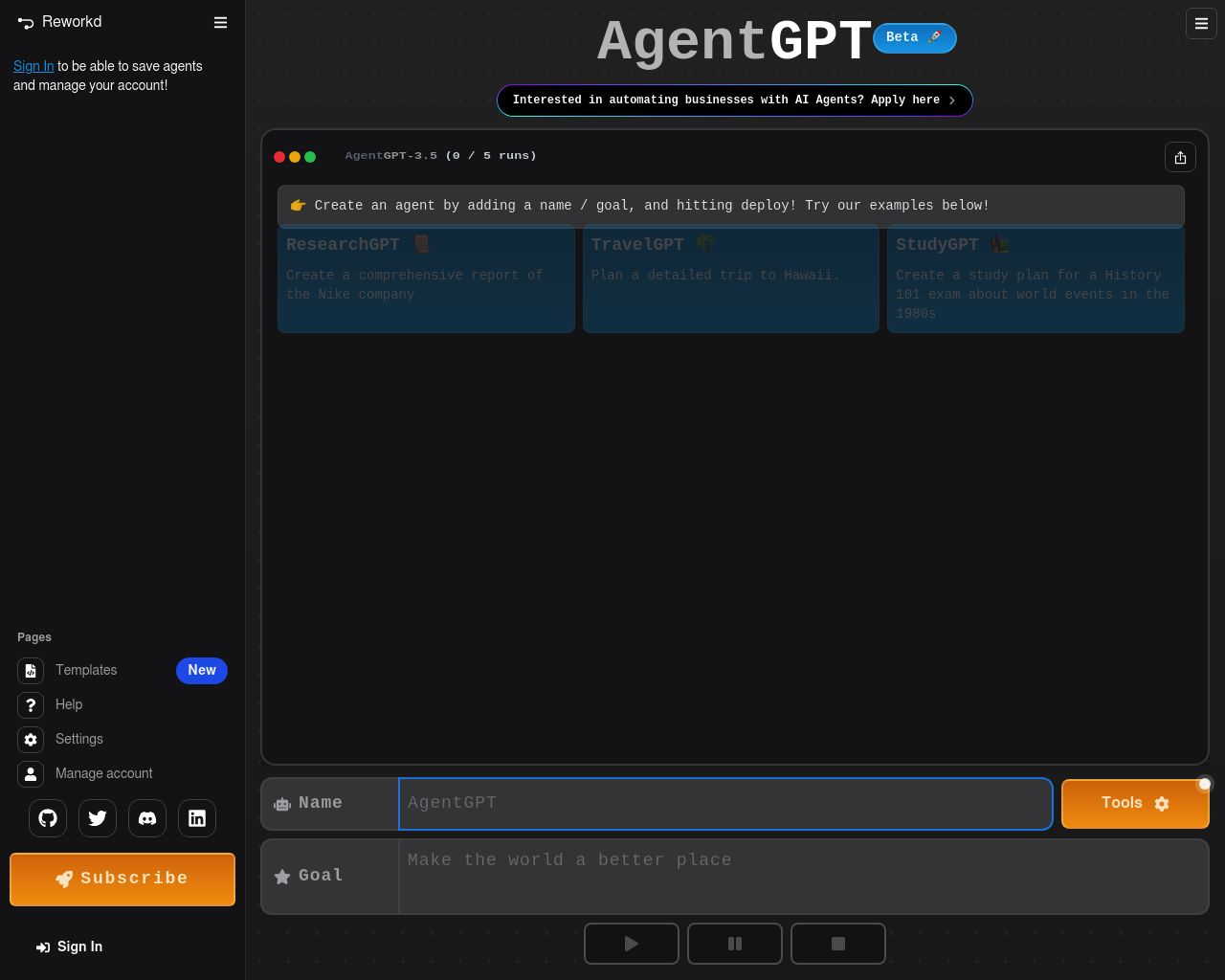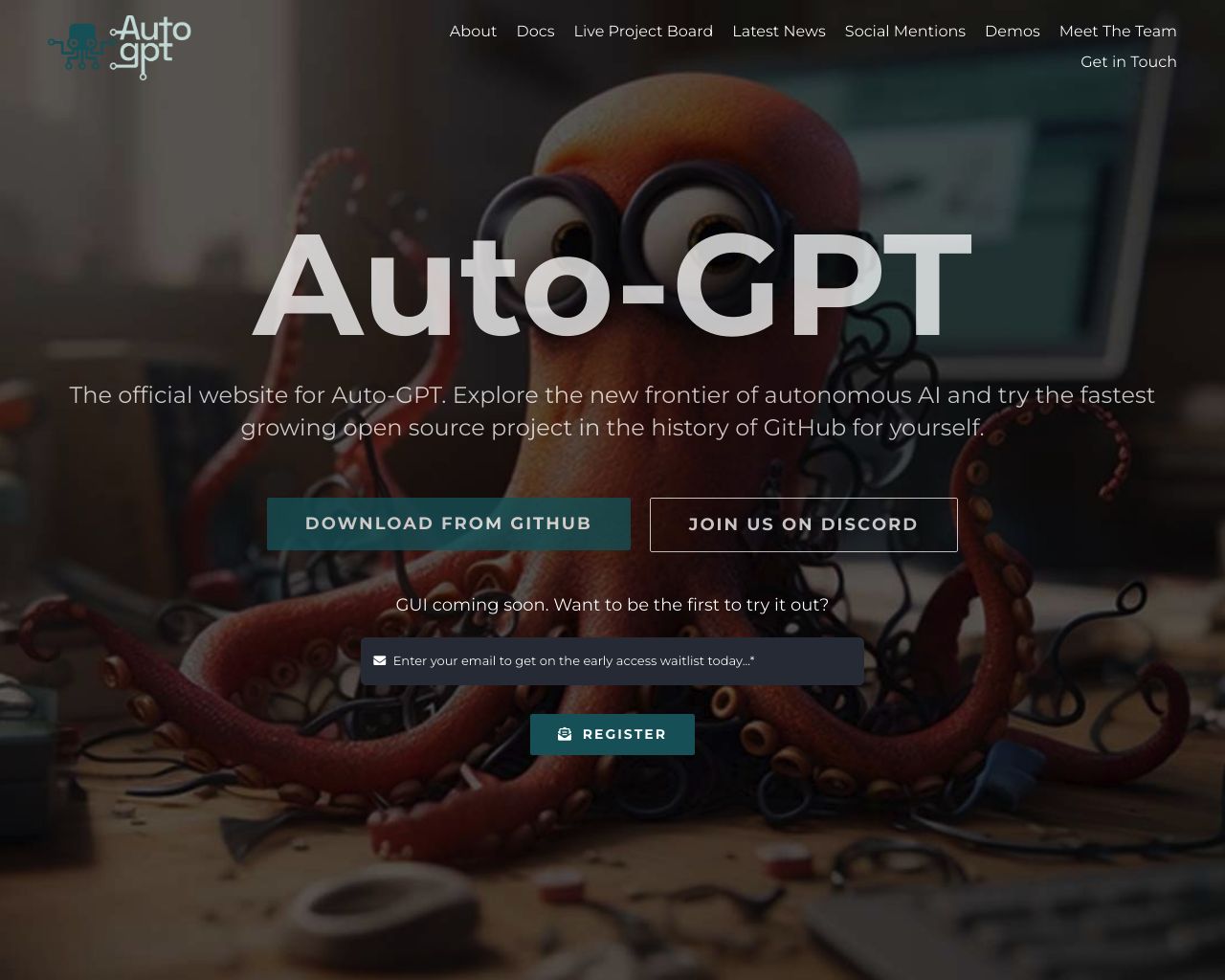AgentGPT vs AutoGPT: A Comprehensive Comparison
AI-powered autonomous agents revolutionize task automation and decision-making across industries. AgentGPT and AutoGPT stand out as powerful platforms for creating these intelligent agents, each offering unique capabilities and approaches. This comparison explores their key features, strengths, and limitations to help developers, business leaders, and AI enthusiasts make informed choices. We’ll also introduce SmythOS, a comprehensive AI development platform that addresses common pain points and offers unparalleled flexibility. Whether you’re building complex AI systems or seeking user-friendly tools for business automation, this guide equips you with essential insights to navigate the evolving landscape of AI agent technologies.
AgentGPT Overview
AgentGPT empowers users to create and deploy autonomous AI agents directly in a web environment. Unlike traditional chatbots, these agents tackle broad, goal-oriented tasks with impressive efficiency.
AgentGPT empowers users to create and deploy autonomous AI agents directly in a web environment. Unlike traditional chatbots, these agents tackle broad, goal-oriented tasks with impressive efficiency.


AgentGPT’s platform shines with its user authentication systems, agent run saving and sharing capabilities, and dynamic translations. The system leverages vector databases for robust memory management, allowing AI agents to retain execution history and access long-term memory. This enhances their ability to handle complex, multi-step tasks effectively.
The system leverages vector databases for robust memory management, allowing AI agents to retain execution history and access long-term memory.
Developers appreciate AgentGPT’s flexibility. The platform supports local runs via docker-compose without requiring an API key, making it accessible for testing and development. For production environments, AgentGPT scales efficiently through its cloud offering, integrating seamlessly with tools like LangChain.
While AgentGPT offers powerful capabilities, it lacks some advanced features found in other platforms. The absence of a visual builder or no-code editor may present a steeper learning curve for non-technical users. Additionally, the platform doesn’t currently support multi-agent collaboration or provide extensive debugging tools, which could limit its utility for more complex AI development scenarios.
Despite these limitations, AgentGPT’s commitment to open-source development and continuous improvement through community contributions makes it a compelling choice for developers and businesses looking to harness the power of autonomous AI agents. Its focus on accessibility and scalability positions it as a valuable tool in the rapidly evolving landscape of AI technologies.
AutoGPT Overview
AutoGPT revolutionizes AI development with its open-source platform for creating autonomous AI agents. These agents execute complex tasks independently, breaking them into manageable subtasks and leveraging internet resources to achieve predefined goals.


AutoGPT’s agents excel in various applications, from software development to market research. They can debug their own code, manage files efficiently, and handle both text and image inputs. This versatility allows for the creation of specialized agents like ChefGPT for recipe generation.
AutoGPT’s agents excel in various applications, from software development to market research. They can debug their own code, manage files efficiently, and handle both text and image inputs.
Despite its advanced capabilities, AutoGPT faces challenges. The platform’s recursive nature can lead to high operational costs, and agents may encounter errors due to self-feedback loops or hallucinations. Additionally, the lack of long-term memory impacts performance in extended tasks.
AutoGPT’s vision aligns with the pursuit of artificial general intelligence (AGI). Its unique selling point lies in autonomous decision-making and task execution, distinguishing it from models requiring constant human input. This innovative approach has garnered significant attention from the tech community and investors, positioning AutoGPT as a pivotal player in the evolving landscape of AI development.
Feature Comparison
AgentGPT and AutoGPT offer distinct approaches to AI agent development. AgentGPT provides a web-based platform for creating autonomous agents, emphasizing accessibility and scalability. Its vector database integration enables robust memory management, allowing agents to retain execution history and access long-term memory. AgentGPT supports local runs via docker-compose without an API key, making it developer-friendly for testing and development.
AutoGPT, in contrast, focuses on creating highly autonomous agents capable of complex task execution. It breaks down large tasks into subtasks, leveraging internet resources to achieve predefined goals. AutoGPT excels in applications ranging from software development to market research, with agents capable of debugging their own code and handling both text and image inputs.
While both platforms offer powerful capabilities, they diverge in key areas. AgentGPT lacks a visual builder and no-code editor, potentially presenting a steeper learning curve for non-technical users. AutoGPT’s recursive nature can lead to high operational costs and potential errors due to self-feedback loops. Neither platform currently supports extensive multi-agent collaboration or provides comprehensive debugging tools, limiting their utility in complex AI development scenarios.
Feature Comparison Table
| AgentGPT | AutoGPT | SmythOS | |
|---|---|---|---|
| CORE FEATURES | |||
| Hosted Agents (Dev, Production) | ✅ | ❌ | ✅ |
| Visual Builder | ❌ | ✅ | ✅ |
| No-Code Options | ❌ | ✅ | ✅ |
| Explainability & Transparency | ❌ | ❌ | ✅ |
| Human-AI Interaction | ❌ | ✅ | ✅ |
| Audit Logs for Analytics | ✅ | ❌ | ✅ |
| Agent Work Scheduler | ✅ | ❌ | ✅ |
| SECURITY | |||
| Constrained Alignment | ❌ | ❌ | ✅ |
| IP Control | ❌ | ❌ | ✅ |
| COMPONENTS | |||
| Foundation AIs | ❌ | ✅ | ✅ |
| Data Lakes | ❌ | ❌ | ✅ |
| DEPLOYMENT OPTIONS (EMBODIMENTS) | |||
| Staging Domains | ❌ | ❌ | ✅ |
| Production Domains | ❌ | ❌ | ✅ |
| Deploy as Scheduled Agent | ❌ | ❌ | ✅ |
| DATA LAKE SUPPORT | |||
| Hosted Vector Database | ✅ | ❌ | ✅ |
| Sitemap Crawler | ❌ | ❌ | ✅ |
| YouTube Transcript Crawler | ❌ | ❌ | ✅ |
Best Alternative to AgentGPT and AutoGPT
SmythOS stands out as the superior alternative to AgentGPT and AutoGPT for AI agent development and deployment. Our platform offers a comprehensive suite of features that address the limitations of both competitors while providing unparalleled ease of use and versatility.
We empower users with a visual drag-and-drop interface, eliminating the need for extensive coding knowledge. This democratizes AI development, making it accessible to technical and non-technical users alike. Our pre-built API integrations and extensive template library accelerate the creation process, allowing you to deploy sophisticated AI agents 99% faster than traditional methods.
We empower users with a visual drag-and-drop interface… making it accessible to technical and non-technical users alike. Our pre-built API integrations… accelerate the creation process, allowing you to deploy sophisticated AI agents 99% faster than traditional methods.
Unlike AgentGPT and AutoGPT, SmythOS excels in multi-agent collaboration and provides robust debugging tools. We offer seamless scalability from development to production, with dedicated environments for each stage. Our platform supports a wide array of AI models and integrates effortlessly with existing business systems, ensuring maximum flexibility and compatibility.
SmythOS prioritizes security and compliance, implementing features like constrained alignment and IP control that are absent in AgentGPT and AutoGPT. We also provide comprehensive audit logs and analytics, giving you full visibility into your AI agents’ performance and behavior.
With SmythOS, you’re not limited to a single deployment option. We support various embodiments, including APIs, webhooks, scheduled agents, and even deployment as ChatGPT plugins. This versatility allows you to integrate AI agents into virtually any workflow or business process, maximizing their impact across your organization.
Conclusion
AgentGPT and AutoGPT offer powerful AI agent capabilities, each with unique strengths. AgentGPT excels in web-based deployment and memory management, while AutoGPT shines in autonomous task execution and complex problem-solving. Both platforms have limitations, such as AgentGPT’s lack of a visual builder and AutoGPT’s potential for high operational costs.
SmythOS emerges as the superior choice, addressing the limitations of both platforms while offering additional advantages. Our drag-and-drop interface and no-code editor make AI agent creation accessible to users of all technical levels. We provide robust debugging tools, support multi-agent collaboration, and offer unparalleled scalability for enterprise-level deployments.
SmythOS’s extensive integration ecosystem, with over 300,000 pre-built API integrations, sets it apart from competitors. Our ’Create Once, Deploy Anywhere’ approach allows seamless deployment across various platforms, from chatbots to APIs. For businesses seeking to harness the full potential of AI, SmythOS offers the most comprehensive and user-friendly solution.
Explore our diverse range of AI-powered agent templates to jumpstart your AI journey. Create a free SmythOS account today and experience the future of AI agent development with our risk-free trial. Join the AI revolution and transform your business with SmythOS.
Last updated:
Disclaimer: The information presented in this article is for general informational purposes only and is provided as is. While we strive to keep the content up-to-date and accurate, we make no representations or warranties of any kind, express or implied, about the completeness, accuracy, reliability, suitability, or availability of the information contained in this article.
Any reliance you place on such information is strictly at your own risk. We reserve the right to make additions, deletions, or modifications to the contents of this article at any time without prior notice.
In no event will we be liable for any loss or damage including without limitation, indirect or consequential loss or damage, or any loss or damage whatsoever arising from loss of data, profits, or any other loss not specified herein arising out of, or in connection with, the use of this article.
Despite our best efforts, this article may contain oversights, errors, or omissions. If you notice any inaccuracies or have concerns about the content, please report them through our content feedback form. Your input helps us maintain the quality and reliability of our information.
